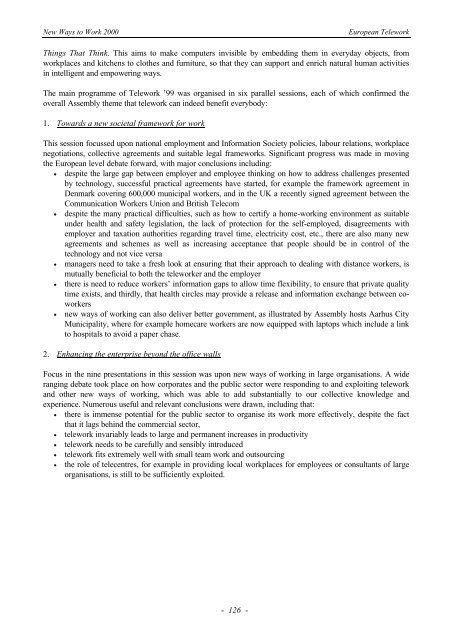eWORK 2000 - European Telework Week
eWORK 2000 - European Telework Week
eWORK 2000 - European Telework Week
- No tags were found...
You also want an ePaper? Increase the reach of your titles
YUMPU automatically turns print PDFs into web optimized ePapers that Google loves.
New Ways to Work <strong>2000</strong><strong>European</strong> <strong>Telework</strong>Things That Think. This aims to make computers invisible by embedding them in everyday objects, fromworkplaces and kitchens to clothes and furniture, so that they can support and enrich natural human activitiesin intelligent and empowering ways.The main programme of <strong>Telework</strong> ’99 was organised in six parallel sessions, each of which confirmed theoverall Assembly theme that telework can indeed benefit everybody:1. Towards a new societal framework for workThis session focussed upon national employment and Information Society policies, labour relations, workplacenegotiations, collective agreements and suitable legal frameworks. Significant progress was made in movingthe <strong>European</strong> level debate forward, with major conclusions including:• despite the large gap between employer and employee thinking on how to address challenges presentedby technology, successful practical agreements have started, for example the framework agreement inDenmark covering 600,000 municipal workers, and in the UK a recently signed agreement between theCommunication Workers Union and British Telecom• despite the many practical difficulties, such as how to certify a home-working environment as suitableunder health and safety legislation, the lack of protection for the self-employed, disagreements withemployer and taxation authorities regarding travel time, electricity cost, etc., there are also many newagreements and schemes as well as increasing acceptance that people should be in control of thetechnology and not vice versa• managers need to take a fresh look at ensuring that their approach to dealing with distance workers, ismutually beneficial to both the teleworker and the employer• there is need to reduce workers’ information gaps to allow time flexibility, to ensure that private qualitytime exists, and thirdly, that health circles may provide a release and information exchange between coworkers• new ways of working can also deliver better government, as illustrated by Assembly hosts Aarhus CityMunicipality, where for example homecare workers are now equipped with laptops which include a linkto hospitals to avoid a paper chase.2. Enhancing the enterprise beyond the office wallsFocus in the nine presentations in this session was upon new ways of working in large organisations. A wideranging debate took place on how corporates and the public sector were responding to and exploiting teleworkand other new ways of working, which was able to add substantially to our collective knowledge andexperience. Numerous useful and relevant conclusions were drawn, including that:• there is immense potential for the public sector to organise its work more effectively, despite the factthat it lags behind the commercial sector,• telework invariably leads to large and permanent increases in productivity• telework needs to be carefully and sensibly introduced• telework fits extremely well with small team work and outsourcing• the role of telecentres, for example in providing local workplaces for employees or consultants of largeorganisations, is still to be sufficiently exploited.- 126 -








